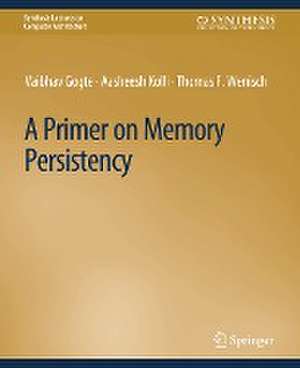A Primer on Memory Persistency: Synthesis Lectures on Computer Architecture
Autor Vaibhav Gogte, Aasheesh Kolli, Thomas F. Wenischen Limba Engleză Paperback – 9 feb 2022
Din seria Synthesis Lectures on Computer Architecture
-
 Preț: 359.05 lei
Preț: 359.05 lei - 18%
 Preț: 690.22 lei
Preț: 690.22 lei - 20%
 Preț: 281.76 lei
Preț: 281.76 lei -
 Preț: 453.85 lei
Preț: 453.85 lei -
 Preț: 226.98 lei
Preț: 226.98 lei -
 Preț: 388.52 lei
Preț: 388.52 lei -
 Preț: 353.79 lei
Preț: 353.79 lei -
 Preț: 481.05 lei
Preț: 481.05 lei -
 Preț: 261.32 lei
Preț: 261.32 lei -
 Preț: 413.27 lei
Preț: 413.27 lei -
 Preț: 494.18 lei
Preț: 494.18 lei -
 Preț: 260.56 lei
Preț: 260.56 lei -
 Preț: 194.92 lei
Preț: 194.92 lei -
 Preț: 450.11 lei
Preț: 450.11 lei -
 Preț: 319.21 lei
Preț: 319.21 lei -
 Preț: 449.53 lei
Preț: 449.53 lei -
 Preț: 264.41 lei
Preț: 264.41 lei -
 Preț: 418.07 lei
Preț: 418.07 lei -
 Preț: 386.22 lei
Preț: 386.22 lei -
 Preț: 486.98 lei
Preț: 486.98 lei -
 Preț: 264.20 lei
Preț: 264.20 lei -
 Preț: 383.71 lei
Preț: 383.71 lei -
 Preț: 346.86 lei
Preț: 346.86 lei -
 Preț: 265.18 lei
Preț: 265.18 lei -
 Preț: 323.45 lei
Preț: 323.45 lei -
 Preț: 260.18 lei
Preț: 260.18 lei -
 Preț: 191.48 lei
Preț: 191.48 lei -
 Preț: 206.29 lei
Preț: 206.29 lei -
 Preț: 205.92 lei
Preț: 205.92 lei -
 Preț: 205.70 lei
Preț: 205.70 lei -
 Preț: 207.06 lei
Preț: 207.06 lei -
 Preț: 260.95 lei
Preț: 260.95 lei -
 Preț: 261.91 lei
Preț: 261.91 lei -
 Preț: 192.63 lei
Preț: 192.63 lei -
 Preț: 262.09 lei
Preț: 262.09 lei -
 Preț: 259.41 lei
Preț: 259.41 lei -
 Preț: 260.95 lei
Preț: 260.95 lei -
 Preț: 456.66 lei
Preț: 456.66 lei -
 Preț: 261.53 lei
Preț: 261.53 lei -
 Preț: 486.42 lei
Preț: 486.42 lei -
 Preț: 210.55 lei
Preț: 210.55 lei -
 Preț: 387.58 lei
Preț: 387.58 lei -
 Preț: 448.38 lei
Preț: 448.38 lei -
 Preț: 264.20 lei
Preț: 264.20 lei -
 Preț: 262.68 lei
Preț: 262.68 lei -
 Preț: 263.06 lei
Preț: 263.06 lei - 20%
 Preț: 288.91 lei
Preț: 288.91 lei -
 Preț: 260.95 lei
Preț: 260.95 lei -
 Preț: 313.82 lei
Preț: 313.82 lei
Preț: 412.68 lei
Nou
Puncte Express: 619
Preț estimativ în valută:
78.98€ • 82.35$ • 65.64£
78.98€ • 82.35$ • 65.64£
Carte tipărită la comandă
Livrare economică 21 martie-04 aprilie
Preluare comenzi: 021 569.72.76
Specificații
ISBN-13: 9783031791932
ISBN-10: 3031791932
Pagini: 95
Ilustrații: XIX, 95 p.
Dimensiuni: 191 x 235 mm
Greutate: 0.21 kg
Editura: Springer International Publishing
Colecția Springer
Seria Synthesis Lectures on Computer Architecture
Locul publicării:Cham, Switzerland
ISBN-10: 3031791932
Pagini: 95
Ilustrații: XIX, 95 p.
Dimensiuni: 191 x 235 mm
Greutate: 0.21 kg
Editura: Springer International Publishing
Colecția Springer
Seria Synthesis Lectures on Computer Architecture
Locul publicării:Cham, Switzerland
Cuprins
Preface.- Acknowledgments.- Persistent Memories.- Data Persistence.- Memory Persistency Models.- Hardware Mechanisms for Atomic Durability.- Programming Persistent Memory Systems.- Conclusion.- Bibliography.- Authors' Biographies.
Notă biografică
Vaibhav Gogte is a Software Engineer at Google. He received his Ph.D. in Computer Science and Engineering fromThe University of Michigan, Ann Arbor in 2020. He received his Master’s in Computer Science and Engineering from The University of Michigan in 2016 and graduated with a Bachelor’s in Electrical and Electronics Engineering from Birla Institute of Technology and Science, Pilani, India in 2011. His research interests are in computer architecture, with a particular focus on architecture, compiler, and systems support for integrating byte-addressable non-volatile memories in future computing systems. His research has been published at several venues, including ISCA, MICRO, ASPLOS, PLDI, and FAST. Aasheesh Kolli is a Software Engineer at Google. His interests are in computer systems architecture; his work includes processor architectures, memory subsystems, programming interfaces, and systems software. His recent research focuses on designing next-generation memory systems, particularly on persistent memory and disaggregated memory systems. Aasheesh received his Ph.D. (2017) and MS (2013) from the University of Michigan, and his BE (2011) from Birla Institute of Technology and Science, Pilani, India. His work has resulted in multiple research papers, including best paper award, at venues like SOSP, ISCA, ASPLOS, and MICRO. He was awarded the 2018 ACM SIGARCH/IEEE CS TCCA Outstanding Dissertation Award. Thomas F. Wenisch is Director of Engineering at Google and an Adjunct Research Scientist (formerly Professor of Computer Science and Engineering) at the University of Michigan, specializing in computer architecture. Wenisch received the NSF CAREER award in 2009, the 2012 University of Michigan Henry Russell Award, a University-wide award for extraordinary accomplishment in scholarship and teaching for early-career faculty, and the Michigan CSE Outstanding Achievement Award for accomplishments in scholarly research, classroom teaching, student mentoring, and leadership in service in 2016. In 2021, Wenisch was awarded the ACM SIGARCH Maurice Wilkes Award, the most prestigious mid-career award in computer architecture, for contributions to memory persistency and energy-efficient systems. He received his Ph.D. in Electrical and Computer Engineering from Carnegie Mellon University
